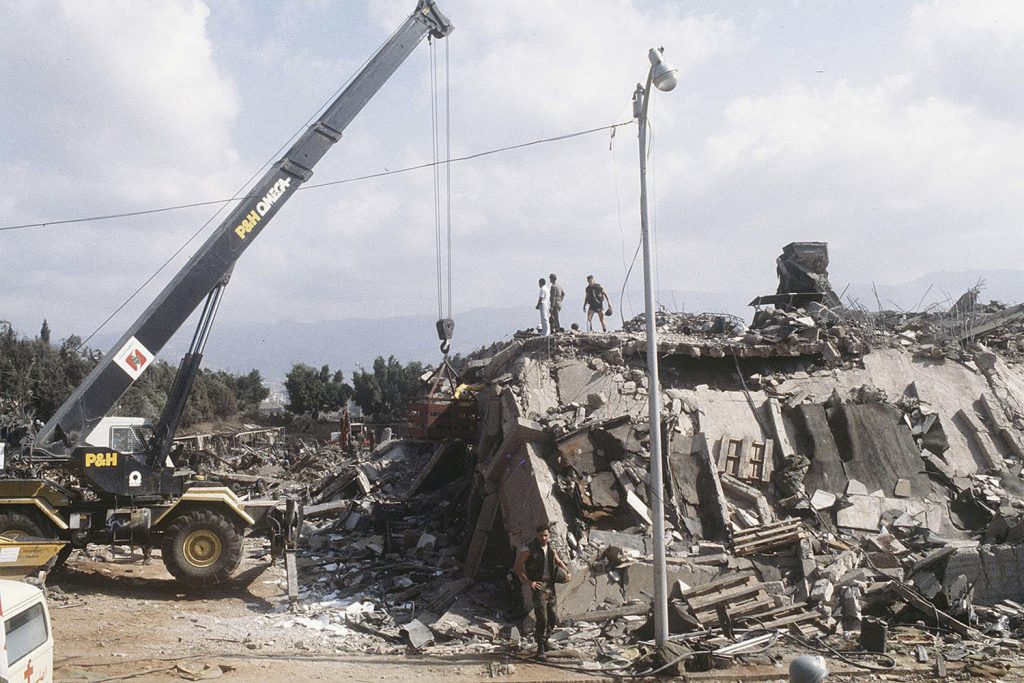
A crane is brought in after the explosion of the Marine Corps building in Beirut, Lebanon October 23, 1983. REUTERS/US Marines/Handout via REUTERS
Thirty-six years ago today, the headquarters of the US peacekeeping
force in Lebanon was destroyed in an act of unconventional warfare commissioned
by Iran, supported by Syria, and executed by the Lebanese adjunct of Iran now
known as Hezbollah. In the words of the United States Department of Defense
investigatory commission, “a truck laden with the equivalent of over 12,000
pounds of TNT crashed through the perimeter of the compound of the US
contingent of the Multinational Force at Beirut International Airport, Beirut,
Lebanon, penetrated the Battalion Landing Team Headquarters building and
detonated. The force of the explosion destroyed the building resulting in the
deaths of 241 US military personnel.”
Then as now (with the recent downing of a US drone and a
missile attack on Saudi oil facilities), the United States opted not to respond
militarily to an Iranian attack.
Thirty-six years ago, the Reagan administration accepted the
investigatory commission’s erroneous finding that the attack was an act of
“terrorism,” because “no attempt was made to seize Marine positions or drive
Marines from the airport.” Labeling it
“terrorism” rather than what it was—an act of unconventional warfare
commissioned by a state seeking to drive the United States from Lebanon—put the
bulk of the onus on a shadowy collection of Lebanese criminals instead of where
it belonged: on Iran and Syria. And when the United States withdrew its forces
from Lebanon in early 1984 without first punishing the perpetrators with
significant military retaliation, Iran in particular drew the conclusion that
it and its agents could target Americans with impunity. And they did.
More recently, Iran seems to be drawing the same conclusion
from a US policy of loud talk and no stick in a region where Tehran is recklessly
active. One need not support the Trump administration’s unilateral withdrawal
from the 2015 nuclear deal to be deeply concerned about the destabilizing
effects of Iran believing it can act militarily with impunity so long as the
United States (not Israel) is the adversary. No doubt Tehran expected to be hit
hard after downing a drone over international waters. But it was not, thereby
fully justifying the most reckless of the Islamic Republic’s operatives. Those
operatives no doubt had an easier case to make to the supreme leader when they
counseled a missile strike on Saudi oil facilities. Again, US passivity
rewarded their aggression.
Thirty-six years ago, an administration in Washington, in a
classic case of mission creep, allowed a peacekeeping mission in Lebanon to
long outlive its usefulness, and actively counseled US peacekeepers to avoid
the appearance of their headquarters and barracks becoming that of a fortified
military installation. The result was a flatbed Mercedes truck driving straight
through the front door, into the lobby, blowing the building off its foundation
and bringing it straight down. Iran, Syria, and local Lebanese were responsible
for the deadly, unprovoked attack. US official incompetence enabled it.
More recently, an administration in Washington, already
militarily passive in the face of Iranian militarism, suddenly decided to
liquidate the most important piece of leverage in its hands for frustrating
Tehran’s takeover of Syria. The sudden decision to abandon territory in
northeastern Syria recently liberated (at great cost) from the Islamic State of
Iraq and al-Sham (ISIS) and to abandon a partner force that had carried the
brunt of ground combat for nearly five years is a gift of great value to Iran
and to the Syrian regime it sustains. It was given freely, with no concessions
demanded or even expected of US adversaries. Friends and foe alike are drawing
damning and destabilizing conclusions about the backbone and reliability of the
United States.
The needless deaths of 241 Americans in October 1983 and the
ill-considered expectation of a “cake walk” in Iraq nearly twenty years later
would combine, in the minds of many Americans, to create the belief that the
United States can do nothing right in the Middle East; that it is a place of
“sand and death” best left to its inhabitants and their neighbors. This
explains why there is a large constituency in the US electorate supportive of
President Trump’s objective, if repelled by his methodology.
Yet there was nothing inevitable about leaving Marines
all-but-defenseless in October 1983. No one forced the Reagan administration to
blame what happened on mysterious, shadowy “terrorists” instead of focusing on states
determined to kill Americans and making sure they paid painful prices. There is
nothing mandatory about passivity in the face of Iranian militarism in 2019,
and there is nothing in international law dictating that the United States make
massive military and diplomatic concessions—amounting to surrender—for nothing
in return. Indeed, the sacrifice of reputation has been gratuitous and
profoundly dangerous.
Perhaps the surprise attack of October 23, 1983 would have registered in Washington as a Levantine version of Pearl Harbor if only Iran and Syria had used their air forces to bomb the building to the ground. Instead they employed a Lebanese driver to deliver the requisite ordnance, temporarily disguising their roles and averting a appropriate responses. The events of October 1983 (including a parallel attack on the French peacekeeping headquarters) reverberate today, as Washington doubles-down on radiating the impressions of weakness and thoughtlessness in a part of the world already dangerously unstable; a region where the worst actors behave recklessly in the belief they enjoy full impunity.
Ambassador Frederic C. Hof is Bard College’s diplomat in residence and an Atlantic Council distinguished senior fellow.
The needless deaths of 241 Americans in October 1983 and the ill-considered expectation of a “cake walk” in Iraq nearly twenty years later would combine, in the minds of many Americans, to create the belief that the United States can do nothing right in the Middle East; that it is a place of “sand and death” best left to its inhabitants and their neighbors.
|